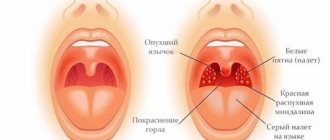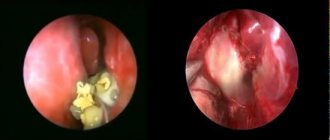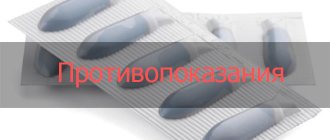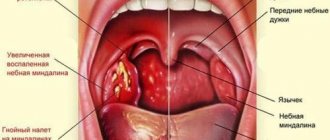One of the most common ENT diseases is tonsillitis. It occurs in both adults and children. The disease is complex, has several types and stages of development. May cause serious health complications. In the acute stage of development, antibiotics are prescribed for tonsillitis. The chronic stage of the disease is no less dangerous than the acute stage. After all, tonsils are infested with staphylococci and streptococci, which constantly poison the body. Despite this, antibiotics are rarely prescribed for the chronic form of the pathology.
What is tonsillitis?
Tonsillitis is an inflammation of the tonsils. It can be acute or chronic. Acute inflammation of the tonsils is called tonsillitis. Long-term and improper treatment of inflammation of the tonsils (tonsils) causes chronic tonsillitis. With this disease, the tonsils are dotted with crypts that open into lacunae in the pharynx.
This paired organ affects the body's immunity. The tonsils are located near the respiratory and digestive systems and affect the heart. If the palatine tonsils are constantly inflamed, then an infection enters the body. This causes constant intoxication.
The chronic form of tonsillitis can be compensated or decompensated. In the first case, sore throats rarely occur. The only thing that worries a person is the plugs on the tonsils. In the decompensated form, a person is susceptible to frequent sore throats, which provokes serious health complications.
Symptoms of tonsillitis include bad breath and a sore throat. With tonsillitis, pain may radiate to the ear. With the disease, the lymph nodes are enlarged; upon palpation, pain occurs at their location.
Tonsillitis in its acute form can cause rheumatism, vasculitis and dermatomyositis. The disease provokes diseases of the cardiovascular and pulmonary systems. May cause gastrointestinal upset, damage to the visual organ, disruption of the kidneys, liver and endocrine system. With chronic tonsillitis, improper functioning of the subcutaneous tissue, adipose tissue and epidermis is often observed.
Antibiotics for tonsillitis are prescribed in acute cases of the disease. Sometimes these drugs are used to treat chronic forms of pathology.
Provoking factors
With any factor with a decrease in immunity, opportunistic bacteria begin to become more active and cause symptoms of sore throat. These factors include: hypothermia, overwork, hypovitaminosis, lack of sleep, lack of nutrition, the presence of chronic diseases, especially infectious ones. In an unhardened child, the frequency of sore throats can be more than 7 times a year.
And the “creators” of chronic tonsillitis in general are: poor environment, dust, work in hazardous industries, cervical osteochondrosis, gastrointestinal pathologies, tobacco smoke, cold and hot food and drinks. The actions of home-grown “medics” can also provoke the appearance of chronic inflammation in the throat, when they themselves incorrectly treat a sore throat without medical participation and control. When interviewing patients, their medical history always includes the fact of having had a sore throat at least once. It does not appear out of the blue.
Types of antibiotics for tonsillitis
The modern market offers a huge selection of drugs. Treatment of tonsillitis with antibiotics in adults should be carried out under the supervision of an ENT doctor. Modern antibacterial drugs quickly remove unpleasant symptoms and relieve exacerbation. The most popular medications are:
- Penicillins. This category of antibiotics is most often used for chronic tonsillitis. They are quickly absorbed into the intestines and are well tolerated by patients. Effective. They are used both for the treatment of adults and in the treatment of children. The dosage is determined by the doctor after diagnosing the patient and determining the severity of the disease.
- Persistent penicillins. Eliminate negative symptoms in a short time. They give good results in the fight against pathogenic bacteria. Helps get rid of relapses.
- Macrolides. No less effective than penicillins. They act quickly. Improvement occurs after the first pill taken. Medicines in this group are slowly eliminated from the body. Therefore, antibiotics for tonsillitis in this category are taken one tablet per day.
- Aminoglycosides. It is used when the cause of chronic tonsillitis is Staphylococcus aureus. Drugs in this group successfully fight the disease and rarely cause side effects. Patients note their effectiveness in treating the disease.
Treatment of tonsillitis with antibiotics has a positive effect on the course of the pathology. The result occurs on 2-3 days of therapy.
Penicillins
Antibiotics for tonsillitis in adults are often used. The most popular drugs are penicillin group medications. They are used both during an exacerbation and to prevent complications of tonsillitis caused by hemolytic streptococcus. The most popular medications are:
- "Amoxicillin." Its action is based on blocking protein synthesis of infected microorganisms. Because of this, microbes stop dividing. Their number decreases, and the inflammatory process in the tonsils goes away. The medicine is used for streptococcal tonsillitis. The medication is produced in the form of tablets and in powder form for the preparation of a suspension. The drug can be administered intramuscularly. The cost varies between 170-200 rubles.
- "Oxacillin." The medicine has a bactericidal effect. Used for infections caused by staphylococci. Absorbed from the intestines quickly and completely. Discharged within two hours. Used for mixed bacterial infections. Available in powder form for injection. One bottle costs about 10 rubles.
- "Ampicillin." Broad-spectrum antibiotic. Resistant to the acidic environment of the stomach. Available in the form of capsules and tablets. It treats pathologies caused by bacteria sensitive to ampicillin. For tonsillitis, tablets are taken up to 4 times a day, every six hours. Ten tablets cost between 8-15 rubles.
Which antibiotics are especially effective for tonsillitis? Inhibitor-protected penicillins have become especially popular in the treatment of this disease. These medications contain clavulanic acid, which makes them resistant to various microbial enzymes. The most famous drugs in this group are:
- "Flemoclav". The drug is available in tablets. The medicine is absorbed into the intestinal walls in a short time and is excreted within an hour. The medication is taken twice a day. The course of treatment is fourteen days. Twenty tablets cost 450 rubles.
- "Panclave". The medicine is characterized by a wide spectrum of antibacterial action. Produced in tablet form. For tonsillitis, drink them three times a day. The therapeutic course is determined by the doctor, but cannot last more than two weeks. The cost of 14 tablets is 300 rubles.
- "Amoxiclav". The drug is active against many gram-negative and gram-positive microorganisms. Available in tablets and powder for suspension. The drug is taken every eight hours, three times a day. The course can last from five to fourteen days. The cost of an antibiotic varies between 200-450 rubles.
- "Ampixed". It is produced in the form of tablets and in powder form for the preparation of a suspension. The drug has bactericidal properties. Treats not only ENT diseases, but respiratory tract infections. Pathologies of the genital organs and biliary tract. Take the medicine twice a day. Duration of therapy is 14 days.
These are the best antibiotics for tonsillitis. They have repeatedly proven their effectiveness in treating this disease.
Other groups of antibiotics
Antibiotics for chronic tonsillitis in adults are also used from the category of second-generation macrolides. Medicines from this group are no less effective than penicillins. They quickly produce results in the treatment of the disease. The best drugs are considered:
- "Sumamed";
- "Clarithromycin";
- "Azitral";
- "Hemomycin";
- "Josamycin".
What other antibiotics can be used for tonsillitis? In addition to the medications described, cephalosporins are often used in the treatment of tonsillitis. The most popular are: Cefuroxime, Cefazidime, Cefepime, Cefoperazone, Cefixime, Ceftriaxone, Ceftibuten.
If tonsillitis appears due to Staphylococcus aureus, then antimicrobial aminoglycoside medications are prescribed. They do not cause side effects and are well tolerated by patients. Amikacin is considered the best antibiotic in this group.
When treating tonsillitis, your doctor may prescribe fluoroquinolones. Among them are:
- "Ofloxacin";
- "Norfloxacin";
- "Lefloxacin";
- "Levofloxacin";
- "Gatifloxacin";
- "Ciprofloxacin";
- "Sparfloxacin";
- "Lomefloxacin";
- "Moxifloxacin";
- "Sparflo".
What antibiotics for chronic tonsillitis help cope with the disease was described above. Doctors also prescribe these medications for sore throats. You should not take antibiotics without a doctor's prescription, as these drugs have contraindications and can cause side effects.
Local preparations
Acute tonsillitis is treated with antibiotics quite successfully. But for better results, local drugs are added to them. These can be sprays, lozenges, gargles and inhalations.
A popular procedure is to rinse the tonsils with a solution containing penicillin or sulfonamide. Duration of treatment is 7-10 days. The lacunae are washed daily using a medical syringe. Furacilin can be used for rinsing.
An alternative to lavage may be paratonsillar injection of the drug into the tonsils. The procedure is carried out if the ulcers are located deep in the tonsils. To perform this manipulation, antibiotics of the penicillin group are used.
In both acute and chronic tonsillitis, inhalation has a beneficial effect on the body. The procedure is carried out with Miramistin, Dioxidin, Tolzigon, Chlorophyllipt. The drugs are diluted with saline solution. The procedures are performed using a nebulizer. If you have tonsillitis, it is forbidden to inhale hot steam.
A good result for sore throat is given by irrigating the throat with Tantum Verde, Hexoral, Inhalipt, and Lugol sprays.
Lozenges play an important role in the treatment of the disease. The best drugs are: Faringosept, Grammidin, Lizobakt, Imudon, Tonsilotren.
Local remedies in combination with antibiotics for tonsillitis speed up the healing process. Improves treatment results. They can be used both for the chronic form of the disease and during exacerbations.
Pills
There are a number of tablets that should also be taken for sore throat along with antibiotics.
Biseptol
Biseptol contains two active components:
- Sulfamethoxazole,
- trimethoprim.
They have a related effect on pathogenic microflora and destroy it.
Peculiarities
The drug belongs to the antimicrobial sulfonamides. Replacing antibiotics with them is possible only if standard antibacterial therapy is impossible for some reason. The medication can be taken from 3 years of age.
Incompatibility
Biseptol should not be taken together with non-steroidal anti-inflammatory drugs (for example, Aspirin). Also, while taking it, you should not take diuretics.
Lozenges and lozenges
These drugs are widely advertised, but they cannot replace rinses and antibacterial therapy. Lollipops relieve pain, but do not affect microorganisms in tissues. Tablets can only be taken in combination with antibiotics.
The most common lollipops and lozenges:
- Strepsils with flurbiprofen,
- Faringosept,
- Septolete,
- Lizobakt,
- Anti-angina, etc.
Antihistamine tablets
As an additional drug, in parallel with antibacterial agents, you need to take anti-allergenic drugs:
- Suprastin,
- Diazolin,
- Tavegil, etc.
Taking them will reduce the likelihood of developing a general allergic reaction of the body to any antibiotic.
Treatment of children
What antibiotics are used for tonsillitis in children? Children are also often prescribed antibacterial drugs. Doctors try to choose the safest and most gentle medications. In therapy, drugs are used not only from the penicillin group, but also from the cephalosporin and macrolide categories. The most popular means include:
- "Oxacillin." Penicillin synthetic drug. Its maximum concentration in the blood is observed after 30 minutes. The medication may cause side effects. A single dosage is 0.25-0.5 g. Newborns are prescribed 90-150 mg per day. For infants up to three months, the daily dosage is 200 mg. For children from three months to three years, the daily dose is increased to 1 g. Patients 2-6 years old are prescribed a daily amount of the drug equal to 2 g. The course is 7-10 days.
- "Phenoxymethylpenicillin." This is another penicillin antibiotic that doctors often prescribe to children. For children under 10 years of age it is prescribed in a dosage of 0.5-1.5 million units. In children over 10 years of age, the drug is prescribed in a daily dose of 3 million units. The daily amount is divided into three doses.
- "Erythromycin". The medicine belongs to the macrolide group. They treat tonsillitis caused by staphylococcal and streptococcal infections. The drug has no effect on fungi and viral infections. The medication is prescribed to children who are allergic to penicillin. For patients over seven years of age, the drug is prescribed to be taken four times a day, 0.25 g. For children under seven years of age, 20 mg of the drug is taken for each kilogram of weight.
- "Benzylpenicillin." The product has bactericidal properties. It can be administered intramuscularly and intravenously. The dosage depends on the severity of the disease and the age of the patient. It ranges from 4 to 6 million units. per day.
Tonsillitis should be treated with antibiotics. Especially if the disease is in an acute stage of development. With improper therapy, the pathology enters the chronic stage and then it is more difficult to treat the disease.
Viral sore throat
The most common cause of inflammation and swelling of the pharynx is viral infections - influenza, acute respiratory viral infections (how are they different), but sore throat after suffering from acute respiratory viral infections is caused by coprophytic coccal flora, which produces purulent plaques. Viral tonsillitis also includes herpetic, enteroviral, and adenoviral (see treatment of enteroviral infection).
Treatment of tonsillitis during pregnancy
Antibiotics for tonsillitis in adult women during pregnancy are rarely used. In the first trimester of pregnancy, antimicrobial drugs are strictly contraindicated. However, even in this situation, acute tonsillitis cannot be treated. The penetration of infection into the body is dangerous not only for the expectant mother, but also for the baby. During this period, internal organs are formed in the fetus and the ingress of microbes causes the development of various pathologies.
Exacerbation of tonsillitis during pregnancy is treated with Flemoxin. This antibiotic is considered the safest. It is quickly absorbed into the walls of the gastrointestinal tract and is also quickly eliminated from the body. Since the medicine quickly leaves the body, without having time to cause harm to the body. This feature of the medication does not affect its effectiveness.
In the second and third trimester, pregnant women are prescribed the following antimicrobial drugs:
- "Amoxicar";
- "Amoxone";
- "Danemox";
- "Klavunat";
- "Medoclav".
Treatment of tonsillitis with antibiotics during pregnancy lasts at least two weeks. Medicines are taken orally one to three times a day. The dosage is regulated by the doctor. In addition to oral medications, topical medications may be used. They speed up the healing process. At the end of therapy, an appropriate analysis is performed to confirm the effectiveness of the treatment.
special instructions
The effectiveness of antibacterial drugs used for tonsillitis depends on careful adherence to several simple recommendations.
First of all, you should not interrupt the course of treatment (or change the prescribed dosage) at the first improvement in your health. In addition, patients should not drink alcohol, fatty or spicy foods, or smoke during antibiotic therapy. If the first dose of medication caused a deterioration in your health or allergic reactions, you must inform your doctor about this.
To avoid symptoms of dysbiosis, both adults and children must adhere to a diet during the treatment period. Until you feel better, it is better to stay in bed.
At the end of the course of therapy, fermented milk products and probiotics should be included in the daily diet to boost immunity.
The best means of preventing recurrent cases of the disease will be hardening, long walks in the fresh air and maintaining a sleep-wake schedule.
Treatment of tonsillitis without antibiotics
Chronic tonsillitis (which antibiotics treat this disease is described above) does not require constant use of antibiotics. To avoid relapses with a chronic disease, you need to lead a healthy lifestyle and constantly strengthen the body's immune system. Rinsing is good for removing inflammation in the tonsils. For the procedure, traditional medicine recommends using the following solutions:
- freshly squeezed lemon juice diluted with boiled water;
- squeezed horseradish juice;
- burdock decoction;
- a weak solution of potassium permanganate with the addition of iodine;
- tincture of golden mustache;
- solution of green tea and garlic.
In addition to these remedies, it is recommended to increase immunity with herbal decoctions. The following recipes have worked well:
- Immortelle in the amount of 100 g, mixed with St. John's wort, chamomile and birch buds, taken in the same quantity as immortelle. The herbal mixture is poured with boiling water and allowed to brew for about four hours.
- Add a tablespoon of kefir to beet juice (50 g), the same amount of rosehip syrup and lemon juice.
A good addition to treating tonsillitis without antibiotics is herbal tea. It may contain chamomile, yarrow, rosehip, nettle and other plants that strengthen the immune system.
Effectiveness of antibiotic use
Does tonsillitis always go away after antibiotics? Unfortunately no. Treatment with these drugs does not produce results when the body is resistant to one or another group of drugs. As a rule, this situation often occurs with drugs of the penicillin group.
If you treat viral or fungal tonsillitis with antibiotics, the therapy will also not give results, since antimicrobial medications do not act on viruses and fungi.
The effectiveness of treatment may be zero if the patient does not comply with the doctor’s instructions. I did not take the full course and stopped taking the medicine for 2-3 days, after improvement.
In all other cases, treatment with antibiotics has a good effect. People feel better after taking the medicine for the first time.
Reviews
It is difficult to say what the best antibiotics are for tonsillitis. Each case is individual. Patients note that good results are obtained by washing the lacunae, lubricating the throat with Lugol, Chlorophyllipt, diluted alcoholic propolis, and treating the tonsils with ultrasound. People speak positively about the drug "Tonsilor". They say that it helps to forget about tonsillitis for a long time.
Among antibiotics, reviews highlight Bicillin injections. Three injections are enough to improve the condition. Such drugs as Avelox, Augmentin, Flemoxin Solutab, Ciprofloxacin, Erythromycin, Zinnat, Sumamed, Azithromycin have earned a good opinion from patients.
In addition to antibiotics, people treated tonsillitis with lozenges such as Trachisan, Lizobakt, Faringosept, and Tonsilotren. Sprays “Lugol”, “Tantum Verde” and “Hexoral” have shown themselves to be effective in the treatment of sore throat.
Strengthening the immune system plays an important role in the treatment of tonsillitis. Therefore, after using antibiotics, doctors often prescribe Immunal, vitamin complexes, and Imupret.
When treating a disease, the right lifestyle plays a huge role. During therapy you should refrain from smoking and alcohol. Do regular exercise and normalize your diet.
Side effects
- Vomiting, diarrhea - from the digestive system;
- Convulsions, signs of meningitis, coma, neurotoxic reactions;
- Allergic reactions - rash, fever, swelling of the skin and other signs.
In some cases, death and anaphylactic shock were recorded. If they occur, adrenaline should be administered intravenously. Manifestations such as thrush in the mouth and genitals are associated with chemotherapeutic effects.
Therefore, it is worth consulting a doctor before using the medicine; other, “easier” remedies may be suitable for you. For example, there are more than a dozen different drugs for the treatment of sore throat.











